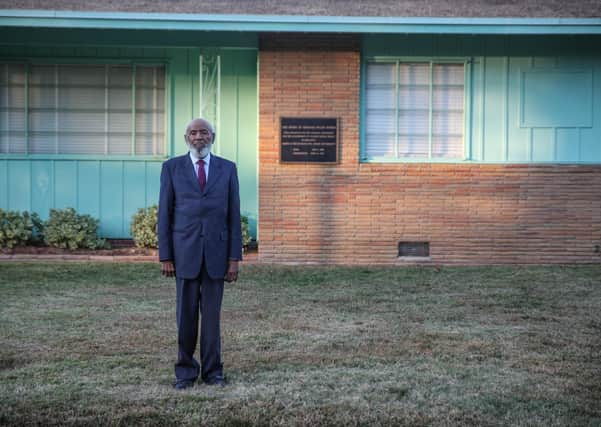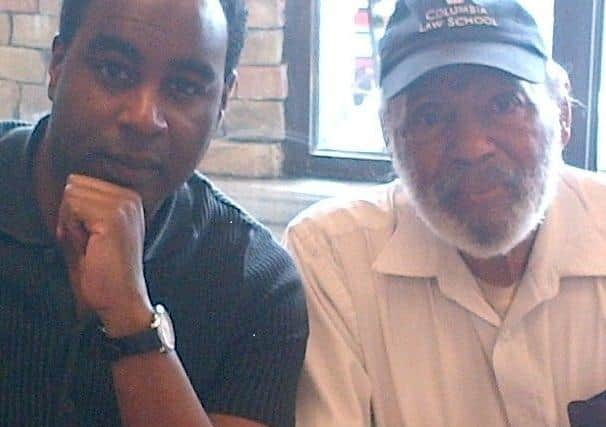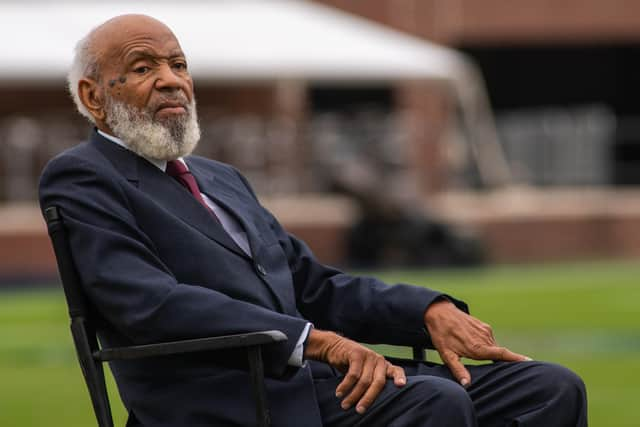James Meredith - the complex anti-racism pioneer asking a very simple question


The word that often crops up around the extraordinary life story of James Meredith – now being explored in a major new documentary made by Yorkshire filmmaker Sol B. River – is ‘complicated’.
As an US Air Force veteran who became the first African-American to study at the University of Mississippi in 1962 against such huge opposition that President John F. Kennedy called in thousands of troops to protect him – before being shot four years later as he walked across the Southern states to encourage black people to register to vote, it would be easy to expect he would be happy to be labelled as a pioneering hero of the civil rights movement. Easy, but wrong.
Advertisement
Hide AdAdvertisement
Hide AdMeredith, now 87, disavows what he terms as the “so-called civil rights movement” for in his view not going far enough in seeking the entirely equal treatment of all US citizens.


But he has also caused great controversy for some of his political alliances. In 1967, he endorsed former Mississippi governor Ross Barnett – the very man who had tried to block his admission to the state’s university.
Then in 1991, when Meredith had been working as a domestic policy adviser for the arch-conservative Republican senator Jesse Helms, he told the Los Angeles Times he had been fired from the role because he was “too far to the right” of Helms after cultivating a friendship with former Ku Klux Klan leader David Duke, who he supported to become Governor of Louisana.
Meredith frequently refuses interview requests but has now allowed one person he does trust – Leeds filmmaker and playwright Sol B. River – to make a new documentary that attempts to tell his full life story for the first time.
Advertisement
Hide AdAdvertisement
Hide AdIn the documentary, called Walk Against Fear: James Meredith and being shown this month on the Smithsonian Channel, Meredith explains: “I always thought my job was to convert bad white folks into good white folks. I consider one of my most significant victories converting David Duke from a Klansman to a former Klansman.”


River admits the 50-minute film cannot examine every aspect of Meredith’s remarkable life.
“The analogy I give with the documentary is was like going up a street and looking down the side streets – we didn’t go down them but we had a look,” he says.
River has a relationship with Meredith dating back almost 20 years, after first meeting him around 2001 when he was writing a drama for Radio 4 based on Meredith’s 1966 Walk Against Fear on which he was shot. River subsequently went on to produce a BBC World Service in 2012 to mark the 50th anniversary of Meredith’s entrance to the University of Mississippi and also did an exclusive interview for Newsnight with him.
Advertisement
Hide AdAdvertisement
Hide AdHe says persuading Meredith to participate in a full-length documentary and finding a channel to show it was a process that took years, as did his own attempts to understand Meredith’s perspective on life.
“I first did a Radio 4 drama back in 2001, then did a BBC World Service interview with him back in 2012 and a Newsnight interview,” he explains. “Since then, I have been trying to convince him to do this documentary. It took me about ten years to understand him. I didn’t get him at all even though I have known him for such a long period of time. What suddenly hit me was the thing he was saying about civil rights and citizenship – ‘I’m born the same as everyone else but these rights and privileges are not there’. I had just not been listening before.”
River says that Meredith’s very deliberate decision to make himself a symbol in the struggle against white supremacy came at great personal cost. “If you can do that and get away with it, fine, but he has been through a lot and suffered a lot for it. There is a lot of tragedy in his family. His parents were shot at, his first wife died of a heart attack. His sister died. He suffered an awful lot.”
He says he can also empathise with some of Meredith’s decisions to reach out to those on the political extremes who may have similar class backgrounds rather than people in the supposed centre-ground as he tried to bring about change.
Advertisement
Hide AdAdvertisement
Hide Ad“Growing up in south Leeds, I lived in Beeston and I went to primary school with some great kids who were friends. But by the time of secondary school, they were in Combat 18 or the National Front – all of a sudden, they didn’t want to be playing on the same football team as me.
“When you are dealing with the liberal-minded, they might say if you give them two or three rights, that is enough but you can’t have all of them. That is the danger of being stuck in the middle ground – you might get a diversity scheme but there is no real intent on having that contribution from that person taken in any way seriously. James Meredith was well ahead on that.”
But while Meredith believed he was altering the views of people like David Duke, I ask River whether there was a danger he was actually inadvertently helping to legitimise such opinions?
“I don’t think you can ever legitimise that way of thinking,” he replies. “But if you are willing to have that conversation, some people will change and some people never will.”
Advertisement
Hide AdAdvertisement
Hide AdRiver, who is director, producer and executive producer of the documentary, filmed it in an intense period in November last year shortly after the birth of his son. He met Meredith in France and then spent two weeks travelling across the US conducting interviews before it was edited back in Leeds.
“It is the first time that I have been in America where I could then say ‘actually, not a lot has changed’. The black middle class has developed but there are poor black people and poor white people and there is a lot of racism. People have had the opportunity to escape the poverty and to an extent they have but not a lot has changed. James Meredith says absolutely nothing has changed.
“When I’m out there it is alright for me to an extent because you are a black guy with an English accent - in the South they have never seen that before. But you can still sense there is a lot of heat around and before you open your mouth people are looking at you in a certain way.”
River, whose first collection of plays in 1996 made him the youngest and first living black writer to be published by Oberon Books, says racism in the UK is more subtle than in the US but nonetheless still very much in existence – later going on to note he hasn’t been invited to write a play in the UK for 17 years.
Advertisement
Hide AdAdvertisement
Hide Ad“I’m not talking about people marching around with Union Jacks. Even with all my experience, I have to prove myself again and again and do the job better than anyone else. So many times in my life especially as a young playwright, you would get invited to all these places and meet all these people. Sometimes people would say to me,
‘You are all right, we can relate’. You get tired because you think ‘well, why shouldn’t we relate?’”
When Meredith first arrived at the University of Mississippi, it led to mass protests and a national political crisis.
Now the once racially-segregated institution - known as ‘Ole Miss’ - has a statue of him in its grounds.
Advertisement
Hide AdAdvertisement
Hide AdIn July 2018, Meredith was inducted into the Alumni Hall of Fame, receiving a standing ovation from tens of thousands of people in the university’s football stadium.
The final shot of the documentary is Meredith sitting alone in a chair on the 50-yard line of the stadium.
“At university, the only thing he couldn’t do was go to a football game because they couldn’t protect him as they were too many people. The only time he goes now is to a football game,” River says.
“For a long time, people didn’t want to know about James Meredith because he wasn’t on one stool or the other politically.
Advertisement
Hide AdAdvertisement
Hide Ad“I guess many people will say ‘What a brave man and how things have changed’ but I do hope they look a bit deeper and ask themselves do these kind of situations still exist and what are we doing about them?”
For all his complexities, the documentary finishes with the very simple question that Meredith has ultimately dedicated his life to getting people to confront – “Am I a citizen or am I not a citizen?”
Election result ‘not Meredith’s focus’
As the US election approaches next month, Sol B. River says Meredith’s focus is on his longer-term aims rather than who ends up being the incumbent in the White House.
“With Meredith it is all about rights and privileges and citizenship so somebody can be who they can be,” he says. “It shouldn’t matter if Trump or Biden is there providing people are getting the opportunity to do what they are meant to do.”
Advertisement
Hide AdAdvertisement
Hide AdRiver says Meredith’s belief in individual choice was underlined when one of the contributors unsure about being in the documentary rang him for advice. “He said, ‘I don’t know what you are talking about’ – he was really saying, ‘You decide’.”
Walk Against Fear: James Meredith airs throughout October on Smithsonian Channel.
Support The Yorkshire Post and become a subscriber today.
Your subscription will help us to continue to bring quality news to the people of Yorkshire. In return, you’ll see fewer ads on site, get free access to our app and receive exclusive members-only offers.
So, please - if you can - pay for our work. Just £5 per month is the starting point. If you think that which we are trying to achieve is worth more, you can pay us what you think we are worth. By doing so, you will be investing in something that is becoming increasingly rare. Independent journalism that cares less about right and left and more about right and wrong. Journalism you can trust.
Thank you
James Mitchinson
Comment Guidelines
National World encourages reader discussion on our stories. User feedback, insights and back-and-forth exchanges add a rich layer of context to reporting. Please review our Community Guidelines before commenting.